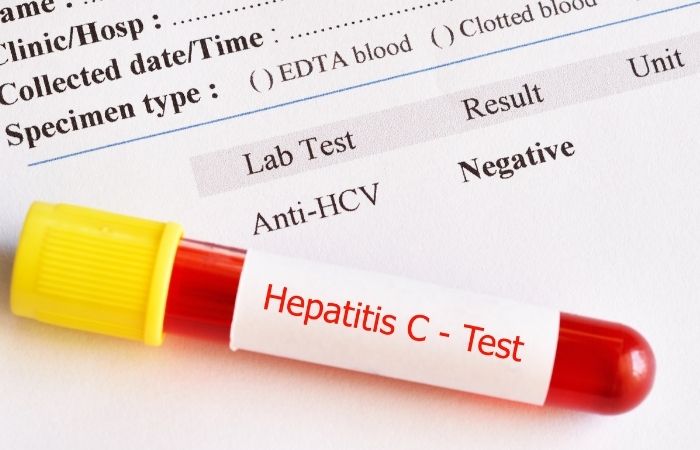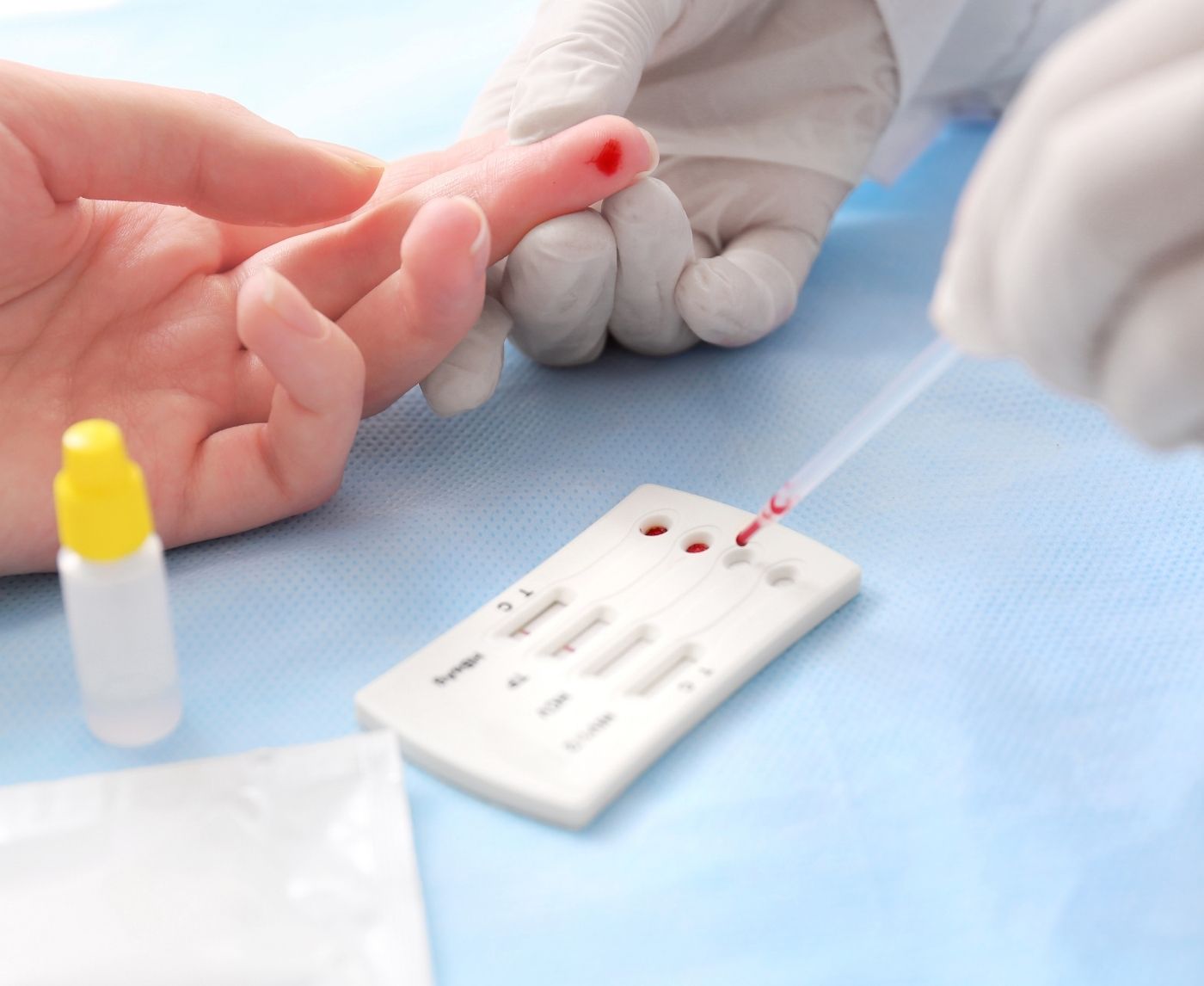Tested Too Soon for HIV? Here’s What That Negative Could Mean
Quick Answer: Hepatitis C often goes undiagnosed because symptoms are subtle or nonexistent for years. Many people discover it by accident, after years of silent liver damage.
How Hepatitis C Hides (Even From Doctors)
Doctors often miss it too, especially in people without “classic” risk factors. If you’re not over 65, don’t use injection drugs, and haven’t had a transfusion before 1992, you may not even be offered the test. That’s part of what makes it so dangerous.

People are also reading: My STD Symptoms Vanished. Was I Cured, Or Just Lucky?
This Isn’t Just Burnout, And Here’s Why
Fatigue is the number one early symptom of Hepatitis C. But it's also the most ignored. We chalk it up to work, kids, stress, hormones. It doesn’t help that Hep C often shows up in your 30s, 40s, and 50s, when those things are all peaking anyway.
Let’s talk specifics. Here’s how people describe what turns out to be Hep C:
Figure 1: Why Hep C gets mistaken for everyday health issues
All of these are easy to overlook or explain away, especially when you’re juggling work, family, or other health issues. That’s what I did. For six years.
How Hepatitis C Enters (Even If You’re “Low Risk”)
There’s a common myth that you can’t get Hepatitis C unless you inject drugs. That’s false. Here’s what no one tells you: this virus is shockingly good at getting into your body through tiny, unnoticed exposures. It can live outside the body for days. It spreads via blood, even dried blood. And yes, you can get it from sex, though it’s less common than other STDs.
Here are some common routes:
- Old tattoos or piercings done in non-sterile environments
- Shared razors or toothbrushes (blood-to-blood contact)
- Sexual transmission, especially with anal sex, rough sex, or menstrual contact
- Blood transfusions or surgeries before 1992 in the U.S.
- Healthcare work or accidental needle sticks
Still think you’re “low risk”?
When Silence Is a Symptom Too
Most people with Hepatitis C don’t feel sick until the liver is already damaged. That’s the terrifying part, it’s a slow burn. You could be going to yoga, drinking green juice, doing everything “right”, and still have this virus working quietly behind the scenes.
The average time from infection to noticeable symptoms can be years. According to WHO data, many people are only diagnosed when they develop cirrhosis or liver failure. That means they’ve already had chronic Hep C for over a decade in some cases.
Here’s how the timeline typically plays out:
Figure 2: Hepatitis C timeline from exposure to chronic disease
“But I Tested Negative Once”, Here’s the Catch
If you got tested for Hep C right after a risky exposure, the result might not have been accurate. That’s because testing too early can lead to false reassurance. Antibody tests usually take 6–12 weeks to become positive, and even RNA tests can miss it if done in the first 3 weeks. I had blood work done 10 days after a risky hookup years ago, negative. So I moved on. But that test was too early to mean anything.
Fast forward years later: I got tested again during an unrelated panel, and this time, it was positive.
That’s why retesting is so important. If it’s been less than 12 weeks since possible exposure, plan to test again at the 3-month mark. For people with symptoms, or just that nagging gut feeling, earlier RNA testing may help, but follow-up is key.
“I Thought I Was Just Burned Out”
Janelle, 42, was a single mom working two jobs when she started feeling off. “I’d wake up with nausea, but no vomiting. I felt tired all the time, but I blamed the night shifts.” She assumed it was perimenopause or maybe thyroid. Her doctor ran basic labs, everything normal. No one offered her a Hep C test.
“I didn’t even know it was something to test for. I wasn’t in a ‘risk group,’ whatever that means.”
Three years later, she collapsed at work from internal bleeding. ER tests revealed cirrhosis. She had chronic Hep C the entire time, and had likely been infected since her early 20s.
“I wish someone told me earlier. A test could’ve saved me years of pain.”
Janelle’s story isn’t rare. In fact, an estimated 2.4 million people in the U.S. are living with chronic Hepatitis C, many without knowing it.
How to Get Tested Without Going to a Clinic
If you’re worried, confused, or don’t feel like explaining your sex life to a stranger, there’s another way. You can test from home. STD Test Kits offers FDA-approved at-home Hepatitis C test kits that detect antibodies with high accuracy. No waiting rooms. No awkward questions. Results in minutes.
Here’s what to know:
- Simple finger-prick test, just a few drops of blood
- Privacy protected, discreet packaging, no ID required
- Fast results, often under 20 minutes
- Backed by clinical accuracy when used at the right window
Don’t wait for symptoms. If you’ve ever had unprotected sex, shared personal grooming items, or had a piercing or tattoo in a non-medical setting, it’s worth testing, especially if it’s been years since your last one.
Do You Need to Retest? Here’s How to Know
If you tested negative for Hepatitis C in the past, but still feel “off”, you might need a second look. A single negative result doesn’t always mean you’re clear. Here’s why:
Let’s say you tested too soon after exposure. Or you were immunocompromised and didn’t mount enough antibodies. Or the test you used had lower sensitivity. These things happen. Even the best test has limits.
Here’s how to think about retesting based on your timeline and risk:
Figure 3: When to retest for Hepatitis C based on exposure and symptoms
Retesting isn’t a sign of paranoia, it’s a sign of care. If you’re still in doubt, it’s worth repeating the test, especially since early treatment can cure Hep C completely before it causes lasting liver damage.
You Got a Positive Result, Now What?
First of all: take a breath. Testing positive for Hepatitis C doesn’t mean you’re doomed or dirty. It means you have a treatable virus, and now you know about it. That knowledge puts you ahead.
Most people with Hep C can now be cured in 8–12 weeks with oral antiviral medications. No injections. No hospital stays. Just pills. New treatments like sofosbuvir-ledipasvir (Harvoni) or glecaprevir-pibrentasvir (Mavyret) have success rates over 95%.
Here’s your basic next step plan:
- Confirm the diagnosis with a lab-based RNA test if your home test was positive
- Schedule a consult, telehealth or local provider can walk you through treatment options
- Don’t delay treatment, the longer you wait, the more damage it can do
- Tell any recent partners, especially if sex involved blood or rough contact
You are not alone. Thousands of people find out they have Hep C every year, and most go on to clear it, feel better, and get their lives back.

People are also reading: Syphilis Exposure Timeline: What Happens in the First 30 Days
FAQs
1. Can you really have Hepatitis C and feel totally fine?
Yes, and that’s the kicker. You can feel completely normal and still have Hep C silently messing with your liver. A lot of people don’t notice anything until there’s serious damage. That’s why doctors call it the “silent” infection. Just because you don’t feel sick doesn’t mean nothing’s going on.
2. Wait, isn’t Hep C just a drug user thing?
Nope. That stigma is old, tired, and flat-out wrong. Sure, injection drug use is one risk factor, but people get Hep C from tattoos, piercings, sex (especially rough or anal), and even sharing razors. One reader told us they got it after sharing nail clippers on a backpacking trip. Blood-to-blood exposure doesn’t ask about your lifestyle first.
3. I’m just tired all the time. Could that be Hep C?
It could be. Fatigue is one of the earliest, and most ignored, symptoms. If you're waking up tired, crashing mid-afternoon, or feeling mentally foggy, don’t just blame stress. Especially if your bloodwork keeps coming back “normal.” If something feels off, it’s worth testing.
4. Does sex really spread Hep C?
It can. It’s not as easily spread as something like chlamydia, but it does happen, especially during anal sex, sex during menstruation, or anything that might involve microtears or blood contact. Condoms help, but even then, transmission can occur. Bottom line: if you’ve had unprotected sex and never tested, do it.
5. I tested once a long time ago, do I need to test again?
If you've had new partners, piercings, or other exposures since then, yeah, it’s smart to test again. Think of it like a reset button. One old test doesn’t give you lifetime immunity. If your risk changed, your testing should too.
6. How accurate are those at-home Hep C tests?
Surprisingly accurate. If you test at the right time (12+ weeks after exposure), rapid tests can be over 98% accurate. They work by detecting antibodies in your blood, just a few drops from a finger prick. It’s fast, discreet, and honestly way less awkward than a clinic visit.
7. What if I test positive? Am I stuck with this forever?
Not at all. Hepatitis C is one of the few chronic infections that’s curable. We’re talking a 95%+ cure rate with new antivirals. Most people clear it in 8 to 12 weeks with daily pills. No hospital. No injections. You get diagnosed, you get treated, you move on. That’s it.
8. Will people judge me if I tell them I have Hep C?
Some might, but the ones who matter won’t. And the truth is, the shame around Hep C is more damaging than the virus itself. You don’t owe anyone your medical history, but if you do choose to tell a partner, there are ways to do it safely, even anonymously through some clinics or apps. You deserve respect, not judgment.
9. Can I just wait it out and hope it goes away?
Technically, a small number of people clear the virus on their own during the early phase. But most don’t. And if you wait too long, you risk cirrhosis, liver cancer, or a transplant. This isn’t like waiting out a cold. The sooner you treat it, the better your shot at full recovery.
10. How do I even start testing without making it a whole thing?
Easy. Order a test kit online. No clinic. No doctor visit. Just you, a discreet package, and results in minutes. It’s like taking back control without asking permission. You can get a Hep C test kit here, and honestly, it might be the most empowering 20 minutes of your month.
The Stigma Is Real, But So Is the Cure
When I told my partner I had Hepatitis C, the first thing out of my mouth was, “I’m so sorry.” But you know what? I shouldn’t have had to apologize for something I didn’t even know I had. The truth is, most people who get Hep C never intended to take a risk. It just… happened. And the shame that comes after the diagnosis can hurt more than the virus.
But here’s the truth: there’s nothing dirty or shameful about catching a virus. Hep C is curable. It doesn’t define your worth. And getting tested, whether you’re scared, confused, or just unsure, is a brave, protective act.
If your head is spinning, peace of mind is one test away. Order a Hepatitis C test kit here, discreet, fast, and doctor-trusted.
How We Sourced This Article: We combined clinical guidance from top health authorities, real-life testimonials, and peer-reviewed studies to create a guide that’s both accurate and emotionally honest. We reviewed over a dozen current sources including the CDC, WHO, and PubMed articles, alongside lived experience narratives. Every external link was verified and opens in a new tab so you can check facts without losing your place.
Sources
1. Hepatitis C – WHO (often undetected until liver damage appears)
2. Hepatitis C Basics – CDC (many people don’t have symptoms)
3. How Untreated Hepatitis C Can Affect Your Body – WebMD
4. Hepatitis C: Symptoms & Causes – Mayo Clinic
5. How Long You Can Live With Hepatitis C Without Knowing – Medical News Today
6. Viral Hepatitis Surveillance – CDC
About the Author
Dr. F. David, MD is a board-certified infectious disease specialist focused on STI prevention, diagnosis, and treatment. He blends clinical precision with a no-nonsense, sex-positive approach and is committed to expanding access for readers in both urban and off-grid settings.
Reviewed by: Dr. Renee Valerio, MPH | Last medically reviewed: September 2025
This article is for informational purposes and does not replace medical advice.






